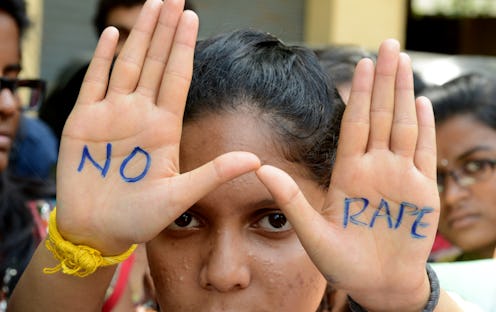News
4 Sexual Assault Facts To Know Before College
The problem of rape on college campus is a major one, one that has gotten a lot of attention over recent years. It's a complicated problem, one with lots of dimensions and far too many faces, and it can be hard to get a handle on it. So what happens if you put three of the people working closely with the issue on a stage together? What sorts of things will they want you to know? Well, the Women in the World Summit decided to find out.
During the Women in the World Summit on Friday, Jon Krakauer, author of Missoula: Rape and the Justice System in a College Town , Annie E. Clark, the co-founder of End Rape on Campus, and Senator Kirsten Gillibrand discussed the nature of campus sexual assault and what schools need to do to fight it. Because sadly, they aren't doing much now.
One of the first things that came up during the discussion was the fact that given how common campus rape is, parents sending daughters off to college need to think about this — and parents sending sons need to talk to their boys.
So what are some things that you should know about campus rape if you're heading off to college or sending a child way to school? Here are four things you can learn from these experts.
1. Rapists aren't the people we're told they are
There's a common misperception that rapists are scary men hiding in the bushes, rather than the cute boy in your math class or the frat boy at the party or the friend who lives down the hall. And yet most victims are raped by someone they know, not a stranger. And even in cases of stranger rape, that doesn't mean the perpetrator won't be a clean cut, straight-A student or revered football star. Rape happens when someone decides to engage in sex (intercourse or otherwise) with someone who has not consented. And there is not one single type of person who is capable of doing that.
Rapists also are typically recidivists. The average college rapists will rape six times while on campus, as Senator Gillibrand points out. And despite the "boys will be boys" rhetoric, rapists typically are very calculated, not out of control. They target women and use alcohol to incapacitate their victims. And they get away with it.
2. Schools need to take the problem seriously
As Annie E. Clark explains, most women and men who have been assaulted on campus really just want to go back to being students. They want to go to class without having to see their rapist. They want to go to parties or do their homework rather than getting bogged down in a court case. They want to live in their dorm without their rapist down the hall. And even if they pursue a court case through the criminal justice system, the police aren't going to keep their rapist off campus. Their college is going to do that.
Moreover, there's also the fact that pursuing a court case can do more harm than good. As Clark points out, research suggests that survivors who go through the criminal justice system tend to have more, and more severe, mental health issues than survivors who don't. Victims often have to relive their trauma over and over again, frequently in unsupportive environments for skeptical audiences, which takes a major toll. And at the end of it, even if the police believe you, even if they go forward with an arrest, even if the prosecutor takes your case, most perpetrators are still not convicted.
In other words, survivors who want to go through the criminal justice system should be supported, but women who don't need another recourse, and if assaulted on campus, that should be their school.
3. Unfortunately, schools aren't taking it seriously now
All three of the panelists made clear that schools are not taking the matter seriously. Senator Gilibrand has introduced legislation to encourage them to do so, but even if it passes, there will still be major work to do. As of now, the senator points out, many schools are far more likely to expel a student for cheating than for rape. And as John Krakauer made sure to mention, over 100 universities are currently under investigation for failing to make their campuses safe.
4. There are people who are working on it, though
There are numerous campus activists trying to address the problem, including young women like Annie E. Clark and her organization. As Senator Gillibrand put it, "This is an advocate's movement led by young women in their 20s." And although it's an uphill battle, it is inspiring to know there are people who are taking it on anyway. So if you're going off to school, maybe consider getting involved.
Images: Getty (4)
